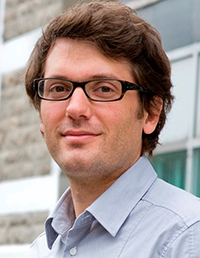Applied Public Health Chair – Yan Kestens

Yan Kestens, MSc, PhD, is an Associate Professor in the Department of Social and Preventive Medicine at the University of Montreal, School of Public Health. He holds an MSc in Geography and a PhD in Urban Planning from Laval University and was awarded a post-doctoral fellowship in Spatial Epidemiology at the University of Montreal. His research interests include the spatial dimension of the relationship between humans and their environment and its impacts on their health.
Dr. Kestens has investigated a wide variety of topics, including active mobility, resource accessibility and the roles of food environments, aging, and mental health. He brings this multidisciplinary background to bear in the research program of his CIHR/PHAC Applied Public Health Chair in Urban Interventions and Population Health.
Dr. Kestens’s decision-maker partners in this Chair are Richard Massé, MD, MSc, FRCPSC, who is the Director of Public Health of the Agence de la santé et des services sociaux de Montréal [Montreal health and social services agency] and Louis Drouin, MD, MPH, the Coordinator of the Urban Environment and Health unit of that same agency.
Dr. Kestens’s Chair
Many cities have now begun to apply the principles of sustainable development to inform conceptual frameworks to guide their interventions in the built environment. The goal is to build cities that are modern, sustainable, attractive, and promote the well-being of their populations. Quite often, these urban-planning objectives closely match the public health objectives of promoting healthy lifestyles, improving population health and reducing social inequalities. But to date, the impact that these interventions have on population health and social inequalities has not been evaluated effectively and therefore remains poorly understood. The goal of Dr. Kestens’s Applied Public Health Chair is to fill this knowledge gap.
Chair Objective
The objectives of the Chair’s research program are to analyze population-based urban interventions, identify the operating mechanisms and conditions required for them to succeed, and thus transform the health of urban populations and reduce health inequalities within them.
This research program will be based in part on the dynamics observed in Greater Montreal and will comprise three complementary initiatives:
- Interventions and Processes: in collaboration with Montreal’s Director of Public Health and his partners, the Chair will conduct a systematic inventory of the interventions planned and carried out in Montreal’s built environment that may influence the health of its population;
- Resulting Changes: the Chair will objectively document the changes in the built environment that actually result from these interventions;
- Mechanisms and Influences: the Chair will use these documented changes in the built environment to model the mechanisms by which they affect population health and to objectively measure their population-health effects.
The goal of this program is to better understand how and why certain urban-based interventions result in behaviour changes and health improvements, while others do not. A variety of innovative methods of collecting and analyzing relevant information will be developed and applied through this research program.
Over time, this program is expected to strengthen collaboration between researchers and policy makers and to shed light on the impact of population-health interventions in the built environment. Through his research, Dr. Kestens hopes to encourage decision-makers to plan and build cities that are healthier for the people who live in them.
Several projects are currently under way in Montreal looking at how changes in urban environments relate to various aspects of healthy aging, including daily mobility and social participation. The new 2016-2020 Montreal Community Sustainability Plan, with various actions targeting quality of life in neighbourhoods, will also offer a unique opportunity to evaluate how transformations of urban environments can improve health and health equity.
Want to know more?
For more information on Dr. Kestens’s research and projects, please visit:
He can be followed on Twitter @spherelabmtl.
Publications
Kestens, Y., Chaix, B., Gerber, P., Despres, M., Gauvin, L., Klein, O., . . . Wasfi, R. (2016). Understanding the role of contrasting urban contexts in healthy aging: an international cohort study using wearable sensor devices (the CURHA study protocol). BMC Geriatr, 16(1), 96. doi:10.1186/s12877-016-0273-7
Kestens, Y., Chaix, B., Shareck, M., & Vallee, J. (2016). Comments on Melis et al. The Effects of the Urban Built Environment on Mental Health: A Cohort Study in a Large Northern Italian City. Int. J. Environ. Res. Public Health, 2015, 12, 14898-14915. Int J Environ Res Public Health, 13(3). doi:10.3390/ijerph13030250
- Date modified: